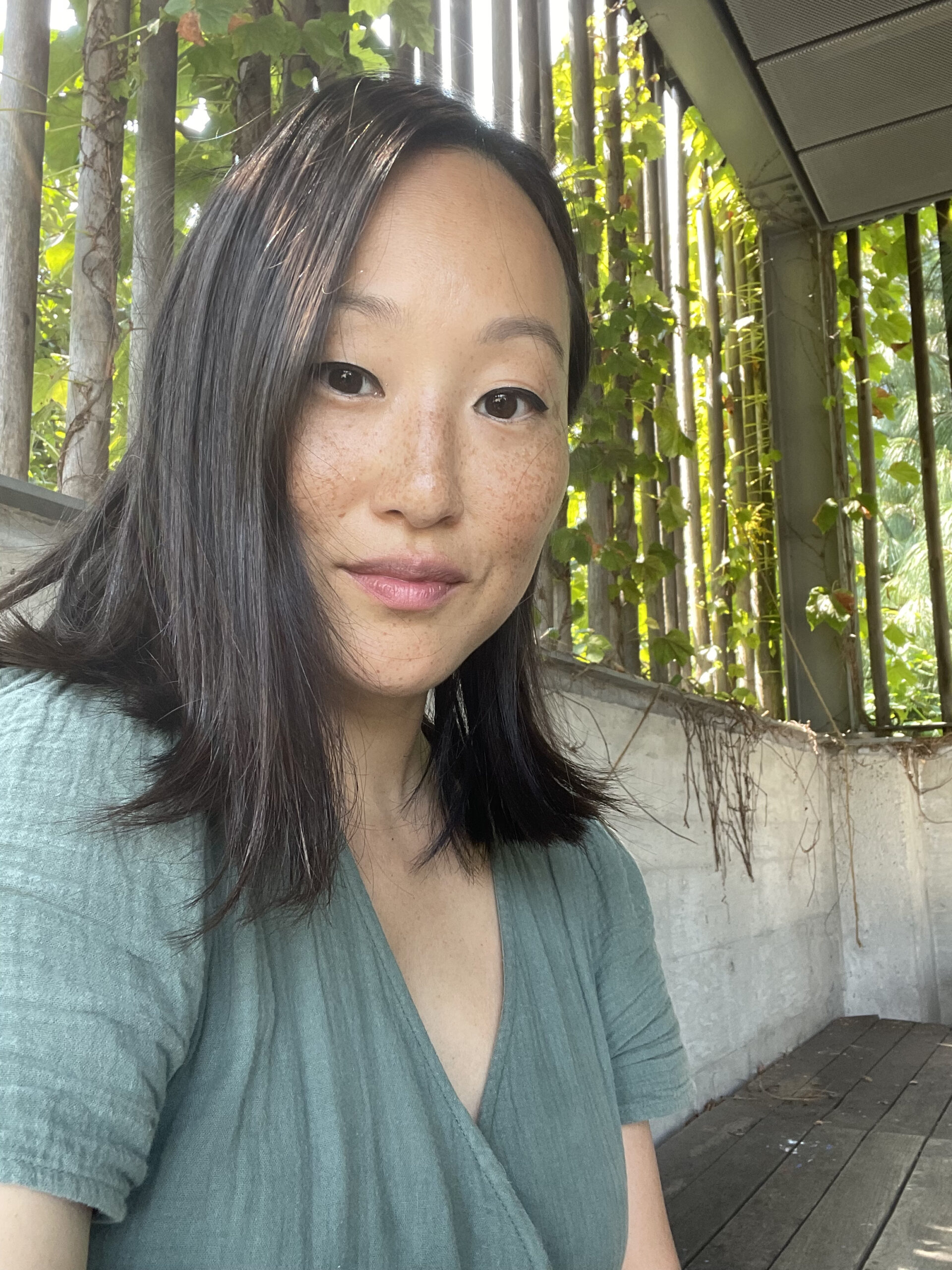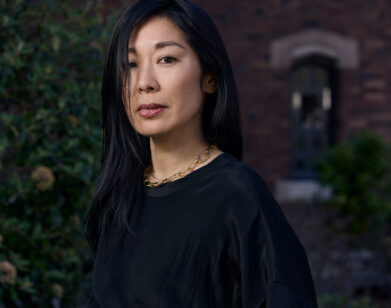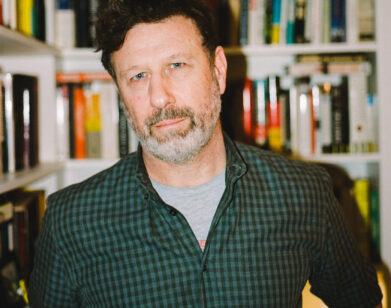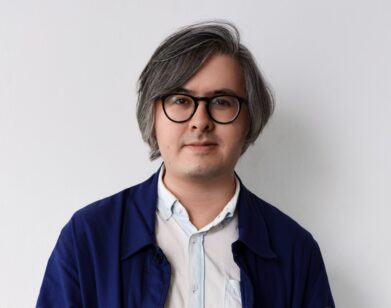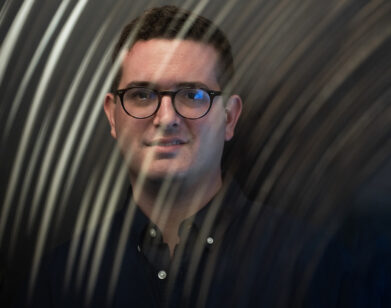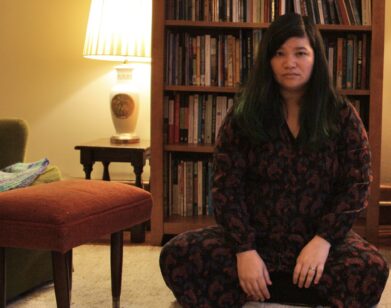LIT
In The Stone Home, Crystal Hana Kim Uncovers a Dark Chapter in Korean History
When I popped into my high school group chat to tell my former classmates that I’d be interviewing Crystal Hana Kim, the first reply read, “Of course she’s a writer.” The second: “is she still blonde?” She and I hadn’t spoken since 2005. Though we became strangers upon graduating, we orbited each other closely: she took a ceramics class across the street from my condo and, at different times, we both attended The Chicago Literary Salon. In 2021, a writing instructor suggested I read If You Leave Me, Crystal’s debut novel, a beautifully devastating epic which landed her on the National Book Foundation’s Top 5 Under 35 list. In the back, just above the author’s bio, was the Crystal Kim I remembered from French class.
Her new novel, The Stone Home, is a brilliantly structured piece of fiction, moving smoothly between two tense timelines: one set in the 1980’s at the titular Stone Home, a South Korean internment camp, the other set in 2011 when a survivor of the camp is approached by a Korean-American holding a familiar knife. Two weeks before her publication day, we met over Zoom to talk about reunions, how food and hope brought levity to her excruciating process, and the haunted artist residency that spurred her to look into this dark chapter of South Korea’s history.
———
STEPHEN BELL: Hey, you look the same. It’s good to see you.
CRYSTAL HANA KIM: I can’t believe it’s been almost 20 years.
BELL: I’ve been avoiding talking to you more than I had to leading up to this because I wanted the high drama of an almost-20-year reunion.
KIM: I know, and I love that it’s writing that brought us back together.
BELL: It makes sense. I was trying to think about what I knew of you in high school, and you were writing even then.
KIM: I was writing a lot. I had a Xanga and I would write a lot on there. It’s funny, I’ve been thinking about high school a lot these days, which I usually don’t, because I just finished an essay on my years as a high school wrestler. It’s been on my mind because I had to ask my old coach for some photos. Looking at my baby self in a singlet and thinking about why I joined the wrestling team, all of that brought back so many memories.
BELL: The wrestling team, and when you bleached your hair. Those are my two big Crystal Kim memories.
KIM: I bleached my hair blonde and ruined it senior year. God, what a wild time.
BELL: So you were writing then. How did the first book come about?
KIM: I always wanted to be a writer, but I didn’t really understand the avenue to becoming a writer, especially coming from an immigrant family. My parents wanted me to be a lawyer or a doctor or something more stable. I wrote If You Leave Me, my first book, mostly in grad school and the years after in Chicago. I was in Hyde Park and I would write my novel, work at my nonprofit job, and then go swim in the lake.
BELL: Oh my gosh, I have been in Chicago for years and I’ve never touched the lake.
KIM: I would go to The Point all the time and just jump off the rocks.
BELL: I love those rocks. There were also babies.
KIM: After the first book, my whole life was just this book. I had a nonprofit job, but the main thing that drove me was the novel. Since the first book, I’ve had two babies, so I feel like my life has just drastically changed.
BELL: And writing is such a solitary practice, but now you’re managing these lives that you’re responsible for.
KIM: Yeah. I would say becoming a parent has totally changed my relationship to time. Before becoming a mother, I was really afraid that it would hamper my writing in some way, and I don’t think that’s the case. It’s made me value my writing time even more. I’m a better person when I’m writing, I just have to work harder to carve out that time.
BELL: I’m curious what you mean about being a better person when you’re writing.
KIM: At the most fundamental level, I’m just crankier if I haven’t written that day, or if I haven’t had access to my artistic self.
BELL: So way before any of these books came out, you were at the Gyeonggi Creation Center in 2016?
KIM: Oh, I wasn’t there, I just read about it.
BELL: What was your interest in that as you were still researching your first book?
KIM: An artist I met in Chicago actually told me about the Gyeonggi Creation Center, which is an artist residency in Korea. I had never done one in Korea and I thought that would be helpful to my writing, but the more I looked into it, the more I realized that the site of this artist residency was once a “reformatory center” during the 1940s, created by Japanese colonizers to force the children of dissidents and “vagrants” into an institution where they could be used for labor. And some of the artist residents that went to this residency spoke of ghosts and hauntings and a lot of trauma in that area. I thought that was extremely haunting and fascinating and scary. I ended up not applying to that residency, but a couple of months later, the Associated Press had an exposé about these “reformatory institutions,” which is just a euphemism for internment camps and prisons created in the 1980s by the South Korean dictatorship. It struck me that the legacy of these institutions created by Japanese colonizers had been repeated by Koreans against their own. That question of, “How could this happen again?” was what really compelled me to start writing what would become The Stone Home.
BELL: There’s so much happening in this novel, and it covers this wide emotional landscape that you navigated really beautifully. A lot of these characters are feeling things that they don’t have time to articulate. They don’t have private moments, and you put us in their bodies in a way that grounds us to how they’re processing the feelings. How did you do that magical thing?
KIM: Thank you. I have an excruciating approach to writing, which is that I start with the premise and some questions or themes I’m interested in, but I’m really just fumbling in the dark and writing to figure out who the characters are. So I did a lot of research, because I’m always compelled by the psychology of my characters. And I think when I do enough research into the psychology of imprisonment and grief, that information gets into my body, maybe by osmosis, and I can then imagine myself in the bodies of my characters. When they’re living through their days in an internment camp, they’re not going to have the time, like you said, to think about their feelings or emotions, so it’s going to exhibit through action.
BELL: That came through really well. The very beginning has a sort of Handmaid’s Tale feeling, where people live at the hand of the state. But there’s a sense that these characters are confoundingly human, because they’re contradicting themselves.
KIM: Thank you. Confoundingly human, I think, is the best compliment for me, because I want my characters to always feel like real people.
BELL: Yeah. My husband and I have a therapy practice, so we spend all of our time just mired in narrative, which informs my writing a bit. And I could see that you were thinking in similar ways. Going back to Atwood, what were your other influences?
KIM: In the beginning, I knew that I wanted most of the narrative to feel very contained within an institution, and I wanted that to create an increasing level of claustrophobia, like a slow burning combustion. My first book spans 16 years and it’s expansive, so constricting myself would be a challenge. So I sought out books that had that similar sense of containment, or were set in institutions, like The Nickel Boys or When the Emperor Was Divine, but I refrained from reading them until I was done because I was afraid of being influenced. I would have them near me so that I could kind of channel their energy, but I wouldn’t read them.
BELL: Okay. This book is set in a prison and it’s terrible and the characters have no freedom, but all of the food descriptions were so lush and inviting. It made me miss things that I hadn’t eaten in a long time since I left New York. And there’s so much labor involved with the preparation of these traditional Korean foods and, from the context that I know them, it’s often a labor of love. It twists the stomach a little bit to have these wonderful, homey meals being prepared by the hands of people who are effectively slaves. What was it like to take something as viscerally comforting as food and make it almost like a weapon used against people in this setting?
KIM: I love that question. I think readers always gravitate to the food in my writing, because I just love writing about food and it’s very instinctive to me. I think that’s because, as the children of immigrants, I have a scarcity mindset. I hate throwing anything away, especially food, and the way that me and my family talk to each other is always, “Have you eaten? You look too thin, you look too fat.” It’s always food related. And like you said, the novel is dark, and I needed something to balance that, for myself and for the reader. And another theme I’m interested in is caretaking and community and how that can sustain someone, even in difficult times.
BELL: Right.
KIM: I thought that it would be really interesting to explore Eunju, one of the narrators, who is in this siloed women’s quarters in the kitchen, where they’re forced to labor and clean and cook for the men and boys in the institution. But there’s also a sense of respite and love among the women, even if there’s also competition and sniping and jealousy. There’s something interesting in that tension between being forced to make food but also showing care through that food.
BELL: It was deliciously complex. I liked how uncomfortable I was watching these people eat this delicious food. Are there going to be food books in the future? Cookbooks?
KIM: No cookbooks, but I’m sure it’ll always be in my fiction.
BELL: I’m curious how you sort of mirrored Eunju and Sangchul. What were you thinking in terms of those two characters being the anchors of the boys side and the girls side of this camp? Were you thinking of them as parallels?
KIM: Going back to that idea of how I just fumble my way through writing—when I first started, Eunju was not in the novel at all, which is shocking, because she’s the heart of the book. But in the beginning, it was a father-daughter narrative. So, it alternated between Narae, a Korean-American woman in Brooklyn in the 2000s, and Sangchul as a teenager in the institution in 1980. I had that because I knew I needed someone who was temporally and geographically removed from the institution to show the long-lasting psychological effects of being in an institution like that. So I thought Narae would be kind of the reader’s way into the book. But the more I wrote, alternating between Narae and Sangchul, the more I realized that I needed a foil for Sangchul who was also in the institution, who would have a narrative that was parallel but would eventually diverge. I was trying to figure out who that could be, and I distinctly remember I was at an artists’ residency in Wyoming. I was writing from Narae’s perspective, and she finds an old photograph amongst her dad’s belongings in Brooklyn and there’s a girl in it, in front of the institution. And Narae is wondering who that girl is. As I was typing that scene, I started wondering who that girl was. That’s when I came up with the idea of Eunju and relegated Narae to this frame structure.
BELL: That’s so wild that she was so tertiary.
KIM: I know. I’m so glad I found her, because she is the driving force of the novel and she almost didn’t exist. I think I knew on some instinctual level that the book wasn’t right until I discovered Eunju.
BELL: Do you reuse any of the things that you end up not using or do they just disappear forever?
KIM: There was kind of a relief in finding Eunju, but it sucked throwing out 60 to 70 pages of Narae’s narrative. I always save everything in documents that are so disorganized. I think there’s a world in which I would take some scenes and put them into a new book, but usually I just save it and I never look at it again.
BELL: I know that I have a perfect sentence about lettuce in a storage unit in Florida somewhere.
KIM: I love that. You have to preserve that and put it in the right piece.
BELL: Because this book is about forces like colonialism and war, it made me ask a lot of questions about who we are, what we are doing. I actually really love a book that leaves me with a bunch of questions. But while you were writing and researching, did you ask yourself questions that you didn’t expect to be asking? And did you find answers that you weren’t expecting to find?
KIM: When I’m writing, I always start with questions but I don’t necessarily expect to find answers, because the questions are so large and complex. And like you, I love books where it doesn’t have that pat ending, because I think that can sometimes feel false An answer that I didn’t expect to find was that I needed to emphasize the caretaking and community that we were talking about earlier. That only came about after I spoke to Han Jong Sun, who was a survivor of one of these real life 1980s institutions called The Brother’s Home. I interviewed him, and that conversation helped me realize that, in addition to showing the darkness within this institution, I also needed to find some sort of sustaining hope. It’s strange—I’m an optimist, but I very much gravitate towards darkness in my writing. I don’t love a happy story. I don’t think they’re as interesting, and I would never say The Stone Home is a happy story, but I needed moments of hope and friendship and love to carry me through the writing of the book.
BELL: Something I kept writing in my notes is “hope.” I think that’s one of your great successes in this book. There was a moment where Eunju’s mother says, “It’s easier to blame me than the world that made me.” I thought that was a really interesting line in any context. And so much of what was happening in this book made me think of what’s happening now in Israel-Palestine. Korea and Israel were formed at around the same time in the ’40s, and those same forces that created these inequitable structures were at the behest of colonial empires based in Europe. The Korean-American character, Narae, and Eunju confront each other after years of separation and there’s this fundamental lack of understanding about the worlds between them. Eunju and Narae have different ideas of what Korea is and what its political history was like, because Eunju was there and Narae just has stories.
KIM: I thought that was really important to show because Narae is able to articulate these structures of oppression that created the institution. She has access to that language, but she also is protected by growing up in the United States. She hasn’t experienced those oppressions in the way that Eunju has, so there’s a disconnect and a naïveté there. She thinks that if Eunju goes to the police, she’ll be able to access some sort of justice. On the other hand, Eunju and Sangchul don’t have the language to articulate how they came to be in the institution or the knowledge of who is in power. Kyungoh, Eunju’s mom, is someone who is easily dismissed, not only by her daughter but by everyone around her, because she is of mixed race, because she has done sex work, because she is aesthetically attractive. But in some ways, she is the most willing to try to articulate the way her position has been created because of these oppressive forces, and she fiercely defends that the way she is moving through the world is in defiance of it, even if it doesn’t look like it.
BELL: She’s one of those characters that’s very present and still kind of intangible in a way that’s really attractive. She inhabits a really interesting mental space for me.
KIM: I really love Kyungoh as a character. As a daughter, Eunju is not able to fully grasp the power of her mother. Oftentimes, as children, we see our parents through one lens. We kind of flatten them. And Kyungoh wants to protect her daughter from some knowledge, so she withholds a lot. There’s a sense that Kyungoh has a lot of power, but as readers, we’re not able to access it because we only see her through her daughter’s perspective.
BELL: Right.
KIM: But I want to go back to what you were saying about Gaza and Israel. It’s so important to ask why and how state-sanctioned violence happens time and again across countries and cultures. It’s one of the reasons why I wrote this book, so that I would continue to ask and witness for myself in the writing of the book, and hopefully other people, when they’re reading it, will have to engage as well.
BELL: I like that. Do you ever think about your parents or your kids picking up these stories?
KIM: I definitely don’t think about it in the writing. I wouldn’t be able to write. My parents can speak conversational English, but they cannot really read a novel in English. And my kids are one and three, so I haven’t had to really think about that. I’m protected in that sense, which is a great relief, because I don’t know if I want to be known fully in that way by the people closest to me.
BELL: That is the most writer answer ever. No one wants to know us. I hope that you’re translated into Korean.
KIM: Yeah, I do want my family to be able to access it in Korean.
BELL: Speaking of which, there are quite a few appearances of Hangul through the book, and no context or explanation for a Western reader. Did your publisher have any issues with that?
KIM: I’m so glad you brought that up. I actually wrote an essay about this, because it’s a topic that I think is really interesting and important. I have a lot of transliterated Hangul or Korean in it, and then I have the actual Hangul. I wanted there to be moments in the text where I open a portal for those who know Korean to access the narrative in a deeper way. While the novel itself is accessible to a wide audience, I still wanted to prioritize a Korean-American reader. And I also just found that there were some moments when the Korean word just was not translatable. Even if I transliterated it, it wouldn’t capture the essence of the ideas and histories within that word.
BELL: I’d like to see more of that in English language fiction.
KIM: Me too. I think multilingual texts will continue to be a greater part of our literature, or I hope so.

